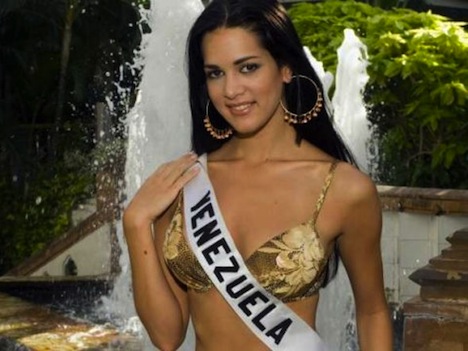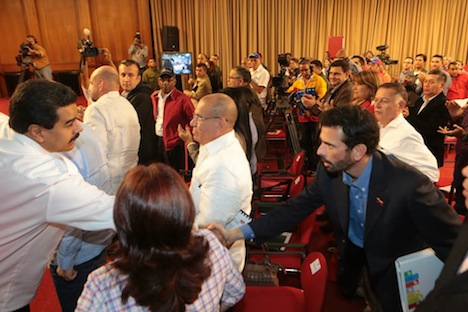Though Venezuela’s crumbling economy was the top issue in 2013, the country’s violent crime rate is now topping the 2014 agenda after the horrific murder of Mónica Spear, the 29-year-old television star and 2004’s Miss Venezuela, and her ex-husband were shot in an attempted robbery, after their car broke down on a highway Monday night.![]()
Violent crime in Venezuela didn’t spring up overnight, but even president Nicolás Maduro admits that 2013 saw a rise in crime. But it’s been on the rise throughout the chavista era. It’s a topic that I discussed earlier today on Fusion’s America with Jorge Ramos (in my first-ever live television interview — next time, I need to know where to put my eyes!).
When Hugo Chávez was first elected in 1999, he and his advisors thought that reducing crime in Venezuela was a matter of reducing poverty and inequality. For all the faults of chavismo, you can point to a substantial reduction in poverty and inequality since 1999, though there’s obviously some debate as to whether the chavistas accomplished that goal in the most efficient, effective or sustainable manner.
Yet even as poverty decreased, violent crime increased steadily over the Chávez era. Official figures aren’t available (and it’s doubtful they would be reliable even if they were), but Observatorio Venezolano de Violencia, an NGO that tracks violent crime, claims that the homicide rate is 79 per 100,000 — a rise in 2013 from a rate of 73 in 2012. That makes Venezuela second only to Honduras, with a 2012 homicide rate of 91.6 per 100,000.
If there’s one point to take away about the link between poverty and violent crime, it’s that the poorest Venezuelans are more likely to be victims of crime themselves. Crime is higher in the cities than in the countryside, and it is highest yet in the barrios of Venezuela’s capital, Caracas — you’re much likelier to be murdered in the more lawless neighborhoods in the mountains overlooking downtown Caracas than in the wealthier and safer valley below. While every murder is a tragedy, Spear’s death is just one of tens of thousands annually. Justice rarely comes for many of those anonymous victims and their families, given that crimes are rarely investigated and even more rarely prosecuted.
Crime is a complex sociological phenomenon, so it’s not easy to point to one variable in particular as its direct cause. Poverty may play a role, but it’s not a matter of ‘if x, then y.’ In the case of Venezuela, the more relevant factors include a high gun ownership rate, corruption and low trust in public institutions, and a climate of political polarization. But the biggest factor is the weakening of the rule of the law over the past 15 years.
As Juan Nagel writes in Foreign Policy, Venezuela has very few judges and prosecutors, and many of them are corrupt. Policemen and other officials commonly take bribes. Jails are overcrowded and controlled by the criminals locked inside them. No one has much faith in the justice system. If you look at the 2013 Corruption Perceptions Index, Venezuela is ranked 160. Afghanistan, North Korea and Somalia are tied for dead-last at 175. That should tell you quite a bit about Venezuela’s culture of impunity. It’s not just the justice system, either. It’s the kind of ‘democracy’ whereby all of the state organs, from state media to the electoral commission to the courts to Petróleos de Venezuela, S.A. (PDVSA), the state oil company, have all been politicized and are today essentially levers to boost chavismo. It’s the kind of ad hoc economic policymaking where rules change from one day to the next, or the Venezuelan president can expropriate a business or nationalize an industry on a whim. That, too, corrodes the rule of law.
That’s also why there’s very little chance that Maduro or any chavista regime is likely to reverse the decade-long trend of greater violent crime. Despite a high-profile photo op with opposition leader and Miranda state governor Henrique Capriles (pictured above), Maduro (like Chávez before him) has worked to strip municipal and state governments of much of their autonomy by consolidating power over local budgets under the national government. That’s especially true for states and municipalities controlled by the opposition. Continue reading Chavismo offers no solutions for Venezuela’s violent crime

